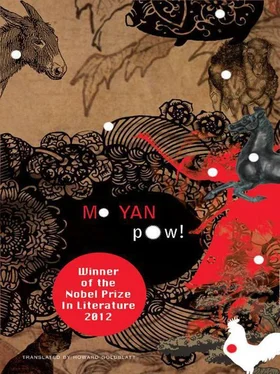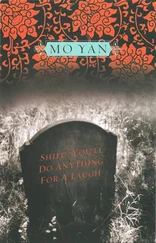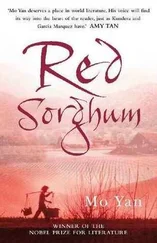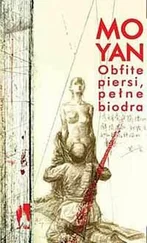‘You know why,’ I said.
‘What's the boy's name?’ the fat lady mumbled as she chewed on a piece of dog meat. ‘Oh, yes, it's Luo Xiaotong. How old are you, Luo Xiaotong?’
‘I don't know.’
‘Do you really not know how old you are?’ she asked, ‘Or do you not want to tell us? How dare you talk that way in front of the village head! What grade are you in? Primary school or high school?’
‘I don't go to school.’ I snarled. ‘I hate school.’
The woman laughed for some strange reason, even squeezed out a few tiny tears. I decided to ignore her, for she had terrible table manners. I didn't care if she was a mayor's mother or the wife of the provincial governor or if she herself was a mayor or something even higher.
I turned to Lao Lan and said sombrely: ‘Tonight. Our place for dinner and drinks. Please don't forget.’
‘All right, I'll be there, for your sake. You can count on it.’
The final two contingents of marchers meet on the highway. The one from West City represents the Madonna Fur Coat Factory, famous for all sorts of leather goods. Owning a Madonna fur or leather coat is the dream of young men and women with empty purses. The contingent comprises twenty male and twenty female models. It's now midsummer, but they are all wearing the company's fur and leather products; they approach the reviewing stand from west to east and, at a signal from the group leader, begin to strut as if on a catwalk. The male models have closely cropped hair and wear stern expressions. Their female counterparts, who have dyed their hair in a rainbow of colours, have that special model look as they sashay along in colourful furs and leathers but display no emotion, more wild animals than human. Even on such a blistering summer day, their unseasonal attire produces not a drop of sweat. Wise Monk, I've heard rumours of a fire dragon elixir that allows a person to bathe in a frozen river in the heart of winter. From the looks of it, there is perhaps also an ice-and-snow elixir that allows a person to stroll under the sun wearing a fur coat on one of the hottest days of summer.
From East City comes a float shaped like a medicinal tablet with the words Di-a-Tab in the Song Dynasty calligraphic style, sponsored by Ankang Pharmaceutical Group. What surprises me is the absence of marchers for a company as famous as Ankang. Just a float, rolling down the street like a gigantic medicinal tablet. I know all about that so-called anti-indigestion remedy, which I'd encountered five years before, when I was wandering the streets of a well-known city and saw little flags with Di-a-Tab ads flapping in the wind from utility poles on both sides of the street. I also saw a Di-a-Tab ad on a huge LCD TV screen above the city square: a single Di-a-Tab is released into an enormous stomach stuffed to bursting with meat; it dissolves into a white mist that then emerges from the mouth. The accompanying text, bland beyond belief, read: ‘After eating a side of beef, with Di-a-Tab you get relief.’ The idiot who wrote that obviously knows nothing about meat. The relationship of meat to humans is very complex, and there are only a few people on this earth who understand it as well as I do. The way I see it, the creators of Di-a-Tab ought to be dragged over to the grassy knoll by the Wutong River Bridge—East City's old execution ground—and shot. After eating your fill of meat, you sit back quietly to enjoy the digestive process, a post-gustatory delight. But these idiots come along with Di-a-Tab, which just shows how low the human race has fallen. Am I right or am I not, Wise Monk?
Finally, all the contingents of marchers are in their assigned spots on the grassy field and, for the moment, the highway in front of the temple looks deserted. A white utility van speeds in our direction from West City, turns off the highway when it reaches the temple and stops under a gingko tree. Three brawny men jump out. One is middle-aged and dressed in an old army uniform faded nearly white from too many launderings. Lively and spry despite his age, he is clearly a man of unusual abilities. I recognize him right away—Lao Lan's follower Huang Bao, a man who's had considerable dealings with our family and who yet remains a mystery, at least to me. The men take a large net out of the van and then spread it open. Then two of them, one on each end, begin walking towards the ostriches, and I know that the end is nigh. Huang Bao has obviously been sent on a mission for Lao Lan, and as such is playing the role of commander. The ignorant ostriches run straight towards the net, and the necks of three of them are immediately snagged by its holes. All the rest, flustered by the trap the others have stumbled into, turn and run, leaving the unfortunate three to struggle and complain hoarsely. After fetching a pair of garden shears from the van, Huang Bao goes up to the net, and—snip, snip, snip—separates the birds’ heads from their bodies at the thinnest part of the necks. The now-headless torsos perform a brief macabre dance before toppling over, spurts of dark blood gushing like a runaway hose from their truncated, python-like necks. The stink of blood seeps into the temple just as Huang Bao and his crew's mortal enemy arrives on the scene, a manifestation of the saying ‘Every evil man fears someone worse.’ Five stony-faced men in black emerge from somewhere behind the temple. The tallest among them, wearing sunglasses, a cigar dangling from his lips, is the mysterious Lan Daguan. As his four henchmen charge Huang Bao and his men, they draw rubber truncheons from their belts and, without a ‘by your leave’, begin cracking open heads. The sickening crunches and spurts of blood chill my heart. No matter what, Huang Bao has been counted as one of us, a fellow villager. I see him holding his head in pain. ‘Who are you?’ he shouts. ‘Who gave you orders to attack us ?’ Blood oozes from between his fingers. His attackers remain silent and simply raise their truncheons once more. Huanb Bao has lost this battle; stumbling over to the highway, he runs away, shouting: ‘Just wait, you guys…’ Now you may think none of this makes any sense but it's all happening before my eyes. Lan Daguan crouches in front of one of the ostrich heads, reaches out and touches hairs that are still quivering. Then he stands up, takes out a white silk handkerchief, cleans his blood-stained finger with it and then throws it away. It is swept up by a gust of wind before it hits the ground and, like an oversized white butterfly, flaps its way over the temple roof and disappears from view. He now walks up to the temple and stands there a moment before removing his sunglasses, as if to show his face. I see the ravages of time on that face and the depths of melancholy in those eyes. A piercing crackle fills the air, a burst of loudspeaker static, followed by a man's husky announcement: ‘Stand by for the Tenth Annual Twin Cities Carnivore Festival and Foundation-Stone-Laying Ceremony for the Meat God Temple !’
At last, Lao Lan, a brown wool overcoat over a military uniform, appeared in the circle of light cast by the lantern and candles in our house, preceded by a hearty ‘Ha-ha!’ His uniform was the real thing: the collar and shoulders still bore traces of insignias and epaulettes. His overcoat, with its bright shiny buttons, was that of a field officer. A dozen or so years earlier, woollen uniforms like that were worn only by local Party cadres, a sign of their status, in much the same way as the legendary grey Dacron Mao tunics symbolized a commune cadre. Lao Lan had the nerve to go out in a woollen uniform despite the fact that he was only a village cadre, which proved that he did not consider himself a minor official. It was rumoured in the village that he and the town mayor were sworn brothers; as a result, in his estimation, all the county and township heads were beneath him. And with justification, since they found it necessary to get in his good graces for their promotions and personal wealth.
Читать дальше












